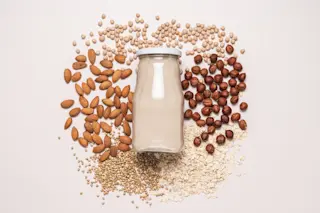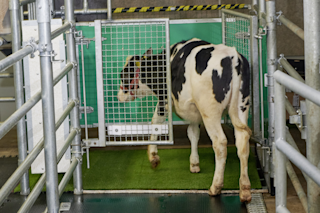Earlier this year, two writers at Mother Jonesnoted:
It's easy to find bad information about the safety of vaccines on the internet.
True, that. It's also easy to find bad information about the safety of GMOs on the internet. What puzzles me is why liberal outlets recognize "bad information" about vaccines but not GMOs. (Grist is now a notable exception, after publishing skewed information on GMOs for years.) For let's be clear: the science on GMOs is as solid and authoritative as it is on vaccines. So why are liberal outlets like the Huffington Post accepting of the scientific consensus on vaccines, but not GMOs? I'm going to lay out an illustrative example of this contradiction in a minute. It has to do with an article on vaccines the Huffington Post rejected several weeks ago and one on GMOs that was recently published. But first, as a refresher, let's review what prominent scientific bodies and institutions have concluded about the safety of GMOs. Here's a handy overview from the Pacific Standard:
Within the scientific community, the debate over the safety of GM foods is over. The overwhelming conclusion is, in the words of the American Association for the Advancement of Science, that “consuming foods containing ingredients derived from GM crops is no riskier than consuming the same foods containing ingredients from crop plants modified by conventional plant improvement techniques.” Major scientific and governmental organizations agree. The U.S. National Academy of Sciences found that “no adverse health effects attributed to genetic engineering have been documented in the human population,” and a report issued by the European Commission made the same claim. The World Health Organization has concluded that GM foods “are not likely, nor have been shown, to present risks for human health.”
The judgement of the scientific community is just as crystal clear on the importance and overall safety of vaccines. The same scientific bodies and institutions that proclaim GMO foods safe to eat also advise children to be fully immunized according to the standard pediatric schedule. Why do some people accept the consensus judgement of expert medical panels and scientific institutions on vaccines but not GMOs? That is the question I wish many of my friends and colleagues in media would grapple with. So how is this discrepancy handled at places like the Huffington Post? Well, I have learned that the person I recently profiled in the Washington Post magazine, Robert Kennedy Jr., had submitted an article to the Huffington Post several weeks ago. It was abundantly annotated (803 footnotes). That, in of itself, doesn't mean anything. What matters is the quality of the studies and scholarship cited. So anyone reviewing the piece would have to be familiar with the medical literature to pass judgement on the merits of the sourcing. Kennedy's piece was rejected by HuffPost after a week of editorial back and forth. I don't find that surprising, since HuffPost has moved away from its anti-vaccine history. And Kennedy's attempts to reignite a debate over thimerosal (a vaccine preservative no longer used in pediatric vaccines in the U.S.) are met with hostility and perceived (for good reason) as giving oxygen to an anti-vaccine movement that is blamed for a resurgence in preventable childhood diseases. Moreover, Kennedy's anti-thimerosal campaign has too often been been waged in a blustery, inflammatory manner, as I chronicled in my Washington Post story. If he would have stuck to a pure debate on the science, as he intones for others, and not peppered his outspoken views with ugly accusations and characterizations of respected scientists and government agencies, he might have been on somewhat friendlier ground with his new book. But this is another story, perhaps to be taken up at a later time. What's interesting to me is the double standard at the Huffington Post. Around the time that Kennedy's piece was being rejected, an article by Carole Bartolotto appeared in HuffPost's Living Well section. It was headlined, "Genetically-Modified Organisisms (GMOs) Have NOT Been Proven Safe." Like Kennedy, Bartolotto is a semi-regular Huffpost "contributor." She is identified as a registered dietitian. Many of her articles for HuffPost have an anti-GMO bent. On twitter, when I said to Bartolotto that her latest piece was an example of denialism, she suggested I was not qualified to judge it, because I wasn't a scientist or health professional. So I asked two scientists who receive no funding from the biotech industry and who work in the field of plant biotechnology to review her article for accuracy. They are Kevin Folta, Professor and Chairman, Horticultural Sciences Department, University of Florida, and Karl Haro von Mogel, a postdoc at the University of Wisconsin, Madison, and Chair and co-Director of Biology Fortified, Inc. Their comments appear under their initials in the review, after Bartolotto's italicized sections. Please do read their commentary. A short excerpt:
In science, we know that nothing is ever "proven," so to demand that science "prove" something safe is a standard that can never be met. It cannot even be met for conventional foods.
It is curious that Kennedy's opinion piece on thimerosal, which argues that thimerosal "is a potent neurotoxin that has never been proven safe," would be rejected, while Bartolotto's article, which argues that "no one can make the claim that GMOs are proven safe," would be published. Both pieces are contrary to scientific consensus. Bartolotto's article is a classic study in Argumentum ad Ignorantiam. It is a fallacious construct that is at odds "with the fundamental concept that science is based on empirical evidence, not fear of our wildest suppositions," Folta says. Kennedy's rejected article, which was published yesterday at Alternet, has a similar logic, although he is arguing that there is a body of scientific studies that actually indicts thimerosal "as a threat to human health." But this is a general statement. It is also misleading, because many substances pose a threat to human health. The question of whether a particular substance is a threat to human health often hinges on what level of concentration we are talking about, and what level of exposure. In the case of the mercury-based thimerosal preservative, it has been determined, after much study, that "there is no convincing evidence of harm caused by the low doses of thimerosal in vaccines," as the CDC states. Nor is there scientific evidence that thimerosal is linked to autism. Kennedy's thesis is that the scientific community is wrong about thimerosal being a safe vaccine ingredient and unduly confident about the lack of evidence for a link between thimerosal and autism. He feels so strongly about this that he wrote a book about it. The article he sought to publish at the Huffington Post (ultimately accepted by Alternet) is about the book and early reaction to it. Was HuffPost right to reject his op-ed while publishing another article on GMOs that similarly rejects scientific consensus? Why does one piece meet HuffPo standards and the other does not? I put that question to Stuart Whatley, HuffPost's executive blog editor. His response via email:
The Huffington Post passed on Robert Kennedy Jr.'s recent post because it failed to meet our medical review requirement that all bloggers provide adequate sourcing for their claims. The other piece you mention, ""Genetically Modified Organisms Have NOT Been Proven Safe," did include adequate sourcing and passed our medical review board, so it was featured on HuffPost.
It would be fascinating to see the sourcing for the GMO article. I wonder if the HuffPost author would share it. As it happens, Mark Hyman is a "medical editor for the Huffington Post" and on its medical review board. He also worked closely with Kennedy on his thimerosal book. He approved of the article that Kennedy submitted. Evidently, he was overruled by the other members, who are listed below: Medical Review Board: Julie Cooper, M.D.; Margaret I. Cuomo, M.D.; Mark Hyman, M.D.; David Katz, M.D.; Sandeep Kishore, Ph.D.; Shireen Khoury, M.D.; Christopher Lillis, M.D., FACP; Prabhjot Singh, M.D., Ph.D. So what's the point I'm trying to make? Well, it's really more a question: Why is denial of scientific consensus on one issue (such as the safety of GMOs) given a forum so frequently at Huffington Post and elsewhere, while similar denial of scientific consensus on another issue (such as as the safety of vaccines) is considered verboten? Is it that one form of denial is more socially acceptable than the other?













